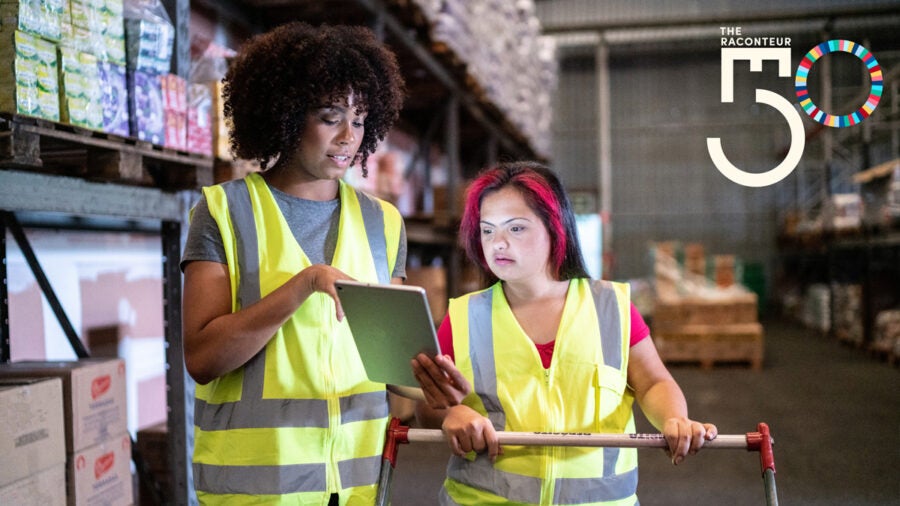
I’m really passionate about DPD becoming an inclusive employer and there are a number of programmes we run to help us achieve this goal.
Over the last 12 months we have established a diversity and inclusion (D&I) forum, which involves the senior leadership team and a number of D&I ambassadors from across the business. These ambassadors are on the ground and understand exactly what DPD needs to change or focus on. We meet on a monthly basis and the forum helps on everything from shaping our future plans to developing training materials.
This forum is led by a dedicated diversity and inclusion team, headed up by our D&I Specialist David Grant. The team both listens and educates – they host employee network groups where they speak to the different communities that make up DPD and understand the challenges they face. They then deliver our ‘All Aboard’ training sessions, teaching our people about different inclusion-related topics.
And so far it seems to be working. In our most recent annual survey, 80% of our respondents agreed we’ve got an inclusive environment.
How and why DPD launched the Inspire programme
Another really important initiative is our Inspire programme, which is all about delivering inclusivity. The programme offers supported work experience, internships and apprenticeships to people with disabilities or special education needs.
Across the UK less than 5% of people with learning difficulties and disabilities are actually making it into employment. When people reach 25, the funding stops quite abruptly in terms of support, so we really wanted to step up and help in this area.
The Inspire programme is all about providing meaningful positions at DPD as well as paid-for work. DPD offers roles across all functions of the organisation, so participants can try out different areas of the business. One key element of the programme is introducing people to the working environment. We try to help participants understand workplace etiquette and how to collaborate with other people.
We’ve also created a number of safe spaces around the offices. When things are a little much and participants might need time out, we make sure to have areas where they can do that as well as offering bespoke training with all of our managers.
What D&I success looks like
We’re really proud of the programme. We originally trialled it across the West Midlands and it was so successful we’re now looking to roll it out across the UK. In my opinion, it’s absolutely the right thing to do. I’m really glad that we can provide that sort of opportunity to a number of individuals.
We’ve run the programme for six years, so we’re becoming experts in this area. As well as introducing the programme across all our locations, we’ve also been working with other businesses that are trying to introduce programmes like this themselves.
How leaders can introduce programmes like this
Reach out to local communities. We partner with a lot of local charities and authorities. A great place to start is wherever you’re situated. Start building a network around wherever your head office is and reach out to local businesses and charities that do work in this area. They are absolutely crying out for help so they will be super supportive and can guide you on your way. They are just looking for willing employment opportunities to really help their people.
We work a lot with local colleges. Candidates for the Inspire programme are often coming to the end of their college experience and trying to work out what’s next for them. So that’s where we’ve worked most closely. Prospective participants can come into the workplace, visit us and see what DPD is all about.
We’ve also created a dedicated team of people within the organisation that are passionate about this programme. They’re actively involved and support both with onboarding and all the way through the whole process. The key thing with a programme like this is getting a solid understanding of participants’ needs, so investing in dedicated people is crucial to make sure participants get the best possible experience working for us.

I'm really passionate about DPD becoming an inclusive employer and there are a number of programmes we run to help us achieve this goal.
Over the last 12 months we have established a diversity and inclusion (D&I) forum, which involves the senior leadership team and a number of D&I ambassadors from across the business. These ambassadors are on the ground and understand exactly what DPD needs to change or focus on. We meet on a monthly basis and the forum helps on everything from shaping our future plans to developing training materials.
This forum is led by a dedicated diversity and inclusion team, headed up by our D&I Specialist David Grant. The team both listens and educates – they host employee network groups where they speak to the different communities that make up DPD and understand the challenges they face. They then deliver our ‘All Aboard’ training sessions, teaching our people about different inclusion-related topics.
